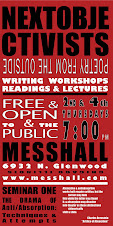The Pleasures of the Door
(translated by Archer)
Kings do not touch doors.
They know nothing of this pleasure: pushing before one gently or brusquely one of those large familiar panels, then turning back to replace it -- holding a door in one's arms.
The pleasure of grabbing the midriff of one of these tall obstacles to a room by its porcelain node; that short clinch during which movement stops, the eye widens, and the whole body adjusts to its new surrounding.
With a friendly hand one still holds on to it, before closing it decisively and shutting oneself in -- which the click of the tight but well-oiled spring pleasantly confirms.
The Pleasures of the Door
(translated by Williams)
Kings never touch doors
They're not familiar with this happiness: to push, gently or roughly before you one of these great friendly panels, to turn towards it to put it back in place -- to hold a door in your arms.
The happiness of seizing one of these tall barriers to a room by the porcelain knob of its belly; this quick hand-to-hand, during which your progress slows for a moment, your eye opens up and your whole body adapts to its new apartment.
With a friendly hand you hold on a bit longer, before firmly pushing it back and shutting yourself in -- of which you are agreeably assured by the click of the powerful, well-oiled latch.
The group was divided on which one of the translations was better. Overall, most people thought that "Kings do not touch doors," was stronger than "Kings never touch doors," but felt that "click of the powerful, well oiled-latch" was better than "well-oiled spring pleasantly confirms." The formality of the Archer translation was noted as compared to the Williams version. The group also mused on the more "American" feel of the Williams version, as well as the muscular sounding consonants in that version. The different translations allowed the group to discuss the differences between voice and tone in each translation. It was also noted that simply being more formal does not make a poem more objective.
Ponge's work is a perfect example of thinking through objects. While he claimed to be disgusted by ideas and philosophies, it's difficult to read his work without seeing metaphorical leaps and connections to the world at large. When discussing "The Pleasures of the Door," a large part of the discussion centered around whether or not the poem was political in nature. Is the poem merely about the pleasures of interacting with a door? The initial line immediately brings us into a political mode of thought -- noting that royalty chooses not to indulge in small pleasures such as opening doors. This brought up a discussion about the gulf between the common people and their leaders. The 1992 incident of President Bush being confused by a barcode scanner at a grocery store came up as modern day example of this problem. www.youtube.com/watch?v=F0flhnboptk
Much was learned from the discussion of Ponge's work, and I think everyone left with a greater appreciation for the objects and pleasures of daily life. Ponge shows us that even the simplest things -- opening doors, oysters, oranges, trees -- are worthy of exploration and investigation.
Join us the second Thursday in April when we will return to some of Franics Ponge's work and try our collective hand at homophonic and regular translations!




No comments:
Post a Comment